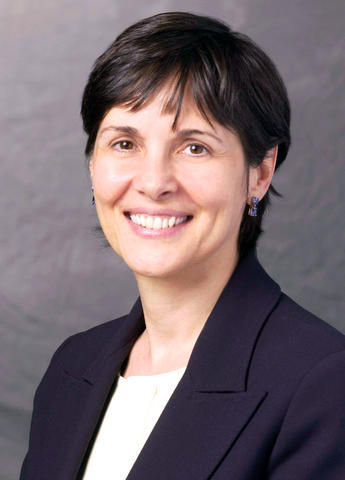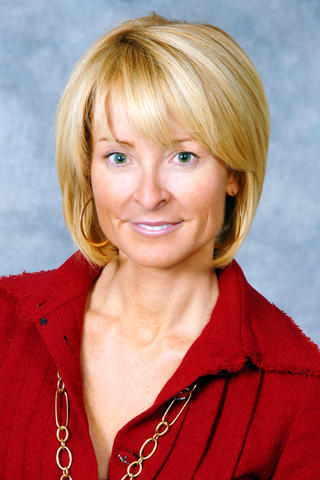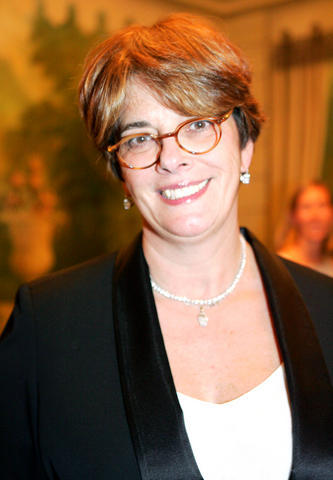In 1982, John Mack, now the chief executive of Morgan Stanley, interviewed a fresh-faced Harvard Business School graduate named Zoe Cruz for an associate position in the company's bond trading business.
They connected over their immigrant roots -- Mack's father was born in Lebanon, Cruz was born in Greece -- and a shared hunger for advancement in one of Wall Street's most prestigious firms.
And advance they did: Supported by Mack, Cruz assumed increasing levels of management responsibility in a firm and industry long dominated by men, eventually becoming co-president of the firm and the most senior woman executive on Wall Street.

PHOTO: NY TIMES NEWS SERVICE
She was also among the highest paid, making US$27 million last year and more than US$100 million since 2001.
But on Thursday morning, Mack gave Cruz the bad news. Her career at the firm was over, now that he and the board had decided to hold her responsible for what could be more than US$5 billion in trading losses from subprime-related investments. Cruz, according to people briefed on the meeting, was shocked -- she never saw it coming.
Polarizing to some, a role model to others, Cruz is a reminder of just how tenuous the careers of women executives on Wall Street can be.

PHOTO: NY TIMES NEWS SERVICE
"John is nothing if not expedient," said Elaine La Roche, a former Morgan Stanley executive and one of the first women partners at the firm. "You can be touched by his magic, but you can also be felled by his sword. I think in recent years the advances made by women in the 1990s have reversed."
Overseeing billions in trading capital, while also surviving the byzantine, often ruthless executive suite jockeying for the top job, can be a challenge for the most steeled and experienced executives. Indeed, a number of men have been fired lately -- most notably E. Stanley O'Neal at Merrill Lynch and Charles Prince at Citigroup -- after their boards decided someone had to take the fall for bad bets in the subprime mortgage market.
But with the extra pressure of being the top female executive on Wall Street, the process becomes all the more difficult.

PHOTO: NY TIMES NEWS SERVICE
With the exit of Cruz, 52, the ranks of top executive women on Wall Street continue to thin. At Citigroup, Sallie Krawcheck, once seen as a successor to Prince, was recently moved from the job of chief financial officer to running the firm's brokerage division. She is no longer considered a candidate to run Citigroup.
Other top executives include Heidi Miller, the chief executive of treasury services at Morgan Stanley; Amy Woods Brinkley, the chief risk officer at Bank of America; and Erin Callan, CFO of Lehman Brothers.
But with Cruz no longer a candidate to run Morgan Stanley, the top executive ranks at the big Wall Street firms remain largely devoid of women with a viable chance of becoming chief executive anytime soon. Women have also not been considered for recently created openings at Citigroup and Merrill Lynch.
Firing a top executive is never a pleasurable experience, as any chief executive will say. But in the case of Mack, who has been a mentor, champion and stubborn defender of Cruz, the decision to force her retirement was undoubtedly wrenching.
On Thursday night, just hours after the news of Cruz's departure had become public, he presided over a cocktail party for former Morgan Stanley executives now in the hedge fund industry at the Asia Society.
"It's been a rough day," he said to the audience, according to a person who was there.
In 1982, Mack was a rising star in the firm's fixed income business -- then a relative backwater for Morgan Stanley compared with its blue-chip underwriting and advisory business. And while women investment bankers could occasionally be found, women traders were a rarity.
With her brash personality, Cruz took quickly to the rough and tumble culture of Morgan's trading business -- soon securing the nickname "Cruz Missile." She carved out a niche as foreign exchange trader with an expertise in derivatives, and in 1993 Mack, who had become president of the firm, made her co-head of the firm's foreign exchange business and one of the top women executives at the firm.
In 2000, Mack promoted her again to a more substantial post: running the bank's fixed income business, one of the biggest profit generators at Morgan Stanley. While Cruz had done well as a foreign exchange trader, running fixed income was a larger challenge, and Mack's elevation of her over male candidates raised eyebrows, according to executives who worked with her at the time.
She tried to strike a balance between showing the emotion and fervor common to Wall Street's top traders -- she, like others, would snap a pencil when frustrated -- and projecting the authority of an executive.
By 2001, when Mack left Morgan Stanley after losing a power struggle to the then-chief executive, Philip Purcell, Cruz was the most senior woman executive at the firm -- and, along with Mary Meeker, the well-known analyst; Ruth Porat, a senior investment banker; and Eileen Murray, a technology executive, lasting examples of Mack's interest in advancing the careers of women.
Indeed, his interest in cultivating the careers of many senior women executives was reflected by his inviting them to exclusive golf outings at his vacation home in North Carolina.
To be sure, Morgan Stanley's record of promoting women is far from perfect -- in 2004, the firm paid US$54 million to settle a claim that a senior fixed income executive did not receive the promotions and pay she deserved because of her sex.
Under Purcell, Cruz's career continued to prosper, but as she rose higher in the firm she began to clash with other top executives -- namely Vikram Pandit, the president of the firm and her boss. Cruz has her defenders, who claim that she was an adept risk taker who, as a mother of three children, encouraged female and male colleagues to strike the right work-family balance. She is married to Ernesto Cruz, a top executive at Credit Suisse.
But her impulsive behavior, as well as her proclivity to play the occasional political card, rubbed others the wrong way. In late 2004, she received a performance review from Pandit that contained some negative comments, according to executives who were there at the time. Feeling that she did not deserve such remarks, in light of fixed-income's strong year, she not only disputed the recommendation, but also flew to London to make her case to the Morgan Stanley director, Laura Tyson.
In early 2005, a group of former Morgan Stanley executives began a campaign to oust Purcell. Pandit and a group of other senior Morgan Stanley executives would leave the firm, and Purcell, in a bid to solidify control, promoted Cruz to co-president.
In the ensuing war, Cruz defended Purcell, drawing what would be the lasting enmity of a group that opposed him.
In 2005, Purcell left the firm and Mack returned. According to people present at the time, Cruz argued to the board that Mack should return, countering misgivings the board had at the time.
Before Mack took the reins, he reached out to Pandit and other executives who had left, including Joseph Perella and John Havens, a close associate of Pandit. None had jobs, and all were open to returning to the firm that they loved -- on the condition that Cruz leave.
Mack, by all accounts, a forceful, stubborn man who, like many executives, has a tendency to be put off by ultimatums, said that they were welcome to return -- but there would be no conditions. Cruz, despite her leading role in one of the ugliest controversies in the firm's history, would stay.
Pandit, who carries the technical and risk management skills that Mack is now seeking in a successor, is a top executive at Citigroup, and none of the others have returned either.
Over the last two years, Cruz has been the chief architect of Mack's aggressive push into in-vogue, high-risk areas like subprime mortgages, loans to private equity funds and more trading of the firm's own capital that resulted in the trading loss.
For a time it seemed as if Cruz would survive. Sensitive to a growing notion on Wall Street that he had not chosen a successor, Mack told executives in the firm that Cruz was the leading candidate -- an abrupt designation that shocked many who felt that suffering the largest loss in the firm's history deserved accountability.
Mack was subjected to a barrage of entreaties from executives saying that Cruz should go, and he relented this week. Cruz's supporters, while understanding Mack's action, are upset.
Did her status as a demanding woman in a male-dominated industry tip the scales against her, they wondered?

Nvidia Corp yesterday unveiled its new high-speed interconnect technology, NVLink Fusion, with Taiwanese application-specific IC (ASIC) designers Alchip Technologies Ltd (世芯) and MediaTek Inc (聯發科) among the first to adopt the technology to help build semi-custom artificial intelligence (AI) infrastructure for hyperscalers. Nvidia has opened its technology to outside users, as hyperscalers and cloud service providers are building their own cost-effective AI chips, or accelerators, used in AI servers by leveraging ASIC firms’ designing capabilities to reduce their dependence on Nvidia. Previously, NVLink technology was only available for Nvidia’s own AI platform. “NVLink Fusion opens Nvidia’s AI platform and rich ecosystem for

WARNING: From Jan. 1 last year to the end of last month, 89 Taiwanese have gone missing or been detained in China, the MAC said, urging people to carefully consider travel to China Lax enforcement had made virtually moot regulations banning civil servants from making unauthorized visits to China, the Control Yuan said yesterday. Several agencies allowed personnel to travel to China after they submitted explanations for the trip written using artificial intelligence or provided no reason at all, the Control Yuan said in a statement, following an investigation headed by Control Yuan member Lin Wen-cheng (林文程). The probe identified 318 civil servants who traveled to China without permission in the past 10 years, but the true number could be close to 1,000, the Control Yuan said. The public employees investigated were not engaged in national

ALL TOGETHER: Only by including Taiwan can the WHA fully exemplify its commitment to ‘One World for Health,’ the representative offices of eight nations in Taiwan said The representative offices in Taiwan of eight nations yesterday issued a joint statement reiterating their support for Taiwan’s meaningful engagement with the WHO and for Taipei’s participation as an observer at the World Health Assembly (WHA). The joint statement came as Taiwan has not received an invitation to this year’s WHA, which started yesterday and runs until Tuesday next week. This year’s meeting of the decisionmaking body of the WHO in Geneva, Switzerland, would be the ninth consecutive year Taiwan has been excluded. The eight offices, which reaffirmed their support for Taiwan, are the British Office Taipei, the Australian Office Taipei, the

CAUSE AND EFFECT: China’s policies prompted the US to increase its presence in the Indo-Pacific, and Beijing should consider if this outcome is in its best interests, Lai said China has been escalating its military and political pressure on Taiwan for many years, but should reflect on this strategy and think about what is really in its best interest, President William Lai (賴清德) said. Lai made the remark in a YouTube interview with Mindi World News that was broadcast on Saturday, ahead of the first anniversary of his presidential inauguration tomorrow. The US has clearly stated that China is its biggest challenge and threat, with US President Donald Trump and US Secretary of Defense Pete Hegseth repeatedly saying that the US should increase its forces in the Indo-Pacific region